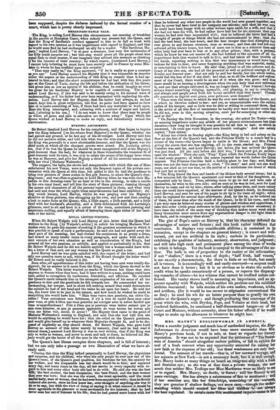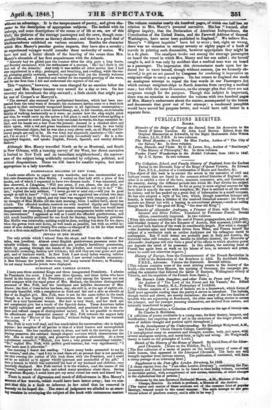MRS. MAURY'S ENGLISHWOMAN IN AMERICA.
WITH a sounder judgment and much less of unchecked impulse, the Eng- lishwoman in America would have been more successful than Mrs. Maury's previous book, if not in sale, at least as regards her literary reputation. It was not to be expected that the authoress of "The States- men of America" should altogether eschew politics, or fail to exhibit the zeal of a fresh convert when any opportunity occurred for raising her new faith at the expense of her old; but these weaknesses are only m01 dental. The account of her travels—that is, of her outward voyage, and her sojourn at New York—is not a necessary book, but it is well enough. Mrs. Maury looks at many things on board an emigrant-ship with a fresh and feminine eye ; as she was at that time a private woman, she saw much that neither Mrs. Trollope nor Miss Martineau were so likely to see or to regard. Mrs. Maury, no doubt, is fluent; still her fluency is not mere -verbiage. She has always a substratum of fact or sentiment ; and if her enmities are, like her friendships, something of the warmest, they are genuine if shallow feelings, not mere cant,—though the under- standing which should control her likes and dislikes is not alwaYs the best regulated. In certain cases this sentimental impulsiveness is not without an advantage. It is the temperament of poetry, and gives cha- racter to the description of appropriate subjects. The ioefield with its icebergs, and some descriptions of the ocean or of life at sea, are of this kind ; the pictures of the steerage passengers and the crew, though occa- sionally literal, are clever as literary sketches ; and there is a good deal of kindheartedness exhibited on various occasions. Besides the character which Mrs. Maury's peculiar genius imparts, they have also a novelty ; no experienced voyager would consider them unworthy of notice. We have not met a better sketch of the heaving of the ocean than Mrs. Maury's chronicle of her first acquaintance with the Atlantic. Scarcely had we glided past the steamer when the ship gave a long heave, and Bursley exclaimed, with the enthusiasm of a seamiut, ' Ha! ha! there is the first roll of the Atlantic.' And truly it was unlike all other motion that I had ever experienced in a ship: prolonged, and breathing, and swelling, while the ves- sel, plunging gently onwards, seemed to recognize with joy the friendly welcome of the ocean billow. I watched and waited for the repeated greeting of the wave, and for the first time I felt and understood the rapture of the sea.
This "rapture," however, was soon changed for an emotion below the heart; and Mrs. Maury became very unwell for a day or two. On her recovery she introduces the ship-steward ; a little sketch that might pass for one of Cooper's or Marryat's. The steward also resumed his professional functions, which had been sus- pended from the total want of demand; his customers having come to a dead-lock in regard to that universally recognized feature in all legitimate consumption— appetite. This man had a most extraordinary, and, in his vocation, an invaluable faculty of walking horizontally as it were: no matter how the ship might pitch and toss, he would carry up the saloon a full glass in each hand without spilling a drop—he seemed to crawl along, his body extended forwards, his legs extended be- hind, and his hands not a foot from the ground: dressed in a checked shirt and white apron, with a red and green bandanna tied round his head, he was verily a most whimsical object; but he was also a very clever cook, as all Black and Co- loured people are said to be. He was kind, but singularly apathetic= Oh! stew- ard, I'm so sick!' ' Well, Ma'am, you can't help it—nobody can't.' He is a dis- tinguished linguist, and speaks English, French, Spanish, and sundry African dialects."
Although Mrs. Maury travelled North as far as Montreal, and South to New Orleans, with a running survey of the West, her direct narrative is limited to New York and its immediate neighbourhood; the narrow- ness of the subject being artificially extended by religious, political, and critical disquisitions. These we will leave for smaller topics, but more appropriate to a lady traveller.
FASHIONABLE MILLINER OF NEW YORK.
I made some efforts to repair my own wardrobe, and was recommended as a first-rate dressmaker to Miss Mullin. I waited on that lady with a piece of fine muslin, out of which I requested to have two dresses made. I was measured, and then observed, i l'Anglame, "Will you come, if you please, the day after to- morrow, at seven o'clock, whenI am dressing for breakfast, and try it on?" "Ma- dam," replied the lady milliner, "1 never go out or send out,—will you be good enough to call in here?" "Oh! very well"; so we appointed one o'clock two days after. On that day it rained, and my tune was engaged with company, and I ne- ver thought of Miss Mullin till the next morning; when I sallied forth, about ten o'clock. The offended modiste received me with insulted dignity and forgiving condescension. "Madam, had I for one moment suspected that you would have disappointed me yesterday, I should have made arrangements better suited to my own convenience." I appeased as well as I could the offended gentlewoman, and with much humility petitioned for one frock for Sunday, being literally gownless. Miss Mullin was inexorable: nothing could be done, nothing was done for ten days; when the gowns were sent home„ as well made as possible, but with an awful ac- count of nine dollars and twenty-five cents—a charge of 21. Is. 6d. for what would cost at a first-rate. milliner's in London 15s. at most.
JEWELS IN THE STATES.
The only article which I missed from the shops, and from the toilette of the ladies, was jewellery. Almost every English gentlewoman possesses some few valuable trinkets: the stones themselves are probably hereditary possessions, which by passing through the hands of the jeweller, and receiving a new and fashionable mounting, become new trinkets; but still they are real gems and pure gold, and of intrinsic worth. In New York I saw many ladies wearing inferior articles and false stones; in Boston, certainly, I saw several valuable ornaments; in New Orleans few jewels were worn, but many natural flowers; in Washing- ton not many handsome jewels were displayed.
EUROPEAN AND YANKEE QUEENS.
I have seen three anointed Kings and three inaugurated Presidents. I admire the Presidents the most. I have seen three Queens, and three ladies who have shared in the honours of the Presidency; and truly among the Queens not one could compare with the regal grace of Mrs. Madison, the feminine distinguished personnel of Mrs. Polk, and the intelligent and ladylike demeanour of Mrs. Adams: the first of these ladies has been, nay, she still is, at the age of eighty-six, eminently beautiful, with a complexion as fresh and fair and a akin as smooth as that of an English girl. Mrs. Polk, were it not for the same defect in the teeth (though in a less degree) which characterizes the mouth of Queen Victoria, Would be a very handsome woman. Her hair is very black, and her dark eye and complexion give her a touch of the Spanish dams. These American ladies are highly cultivated and perfectly accomplished, and practised in the most de- licate and refined usages of distinguished society. It is not possible to observe the affectionate and deferential manner of Mrs. Polk towards the august lady who is now the "Mother of the Republic," without feeling for each the warmest admiration. • • • • Mrs. Polk is very well read, and has much talent for conversation: she is highly popular: her reception of all parties is that of a kind hostess and accomplished gentlewoman. She has excellent taste in dress, and both in the morning and the evening preserves the subdued though elegant costume which characterizes the lady. She is ready at reply, and preserves her position admirably. At a levee a gentleman remarked, "Madam, you have a very genteel assemblage tonight." " Sir," replied Mrs. Polk, with perfect good-humour, but very significantly, "I never have seen it otherwise."
One morning I found her reading. "I have many books presented to me by the writers," said she, "and I try to read them all; at present that is not possible; but this evening the author of this book dines with the President, and I could not be so unkind as to appear wholly ignorant and unmindful of his gift." I wore a brooch in which was contained the hair of my husband and children, very tastefully displayed. Mrs Polk carried it to the window, read the names of the "eleven, compared their hair, and asked many questions about them. Saving her gracious Majesty, I could have put my arms round her neck and kissed her.
There is much of digression and much of diffusiveness in Mrs. Maury's account of her travels, which would have been better away ; but we sus- pect that this is a fault so inherent in her mind that its removal is scarcely to be hoped for. The want of judgment we alluded to at start- ing consists in overlaying the subject of the book with extraneous matter. The volume contains nearly six hundred pages, of which one half has no relation to Mrs. Maury's personal narrative. She has " learned, after diligent inquiry, that the Declaration of American Independence, the Constitution of the United States, and the Farewell Address of General Washington, have never been published in England." We believe Mrs. Maury's "diligent inquiries" have led to error ; but, right or wrong, there was no occasion to occupy seventy or eighty pages of a book of travels in printing such documents, however appropriate they might be in a fit place. The smallpox broke out among the steerage passengers on board the vessel in which Mrs. Maury and her son sailed ; she herself caught it, and it was only by accident that a medical man was on board as a passenger. The impression this circumstance made upon her in- duced her to exert herself; though without success, (as we formerly ob• served,) to get an act passed by Congress for rendering it imperative On emigrant-ships to carry a surgeon. On her return to England she made an analogous attempt to repeal the four words in our Passengers Mt which exempt emigrant-ships to North America from carrying a medical man ; but with the same ill-success, on the strange plea that there are not surgeons enough for the purpose. Though this subject is important, there was no occasion to encumber the volume with two hundred pages of Mrs. Maury's endeavours about the matter, accompanied by the letters and documents that grew out of her attempt : a condensed pamphlet would have served her purpose better, and would have told better in a separate form.



























 Previous page
Previous page